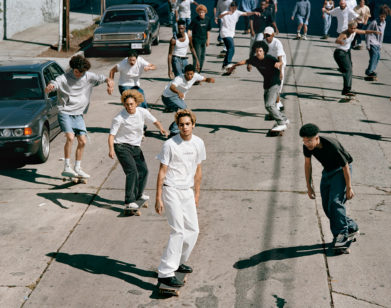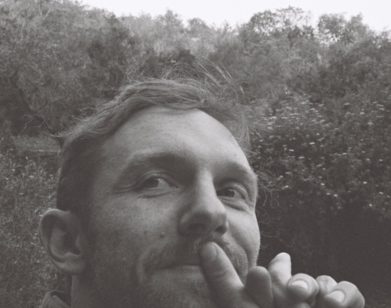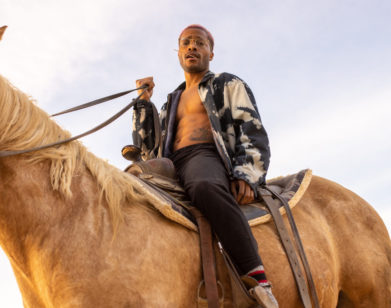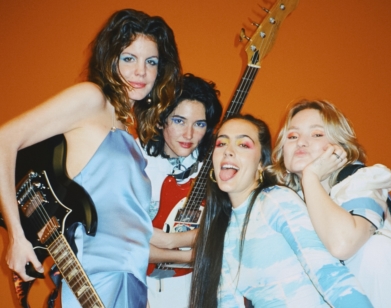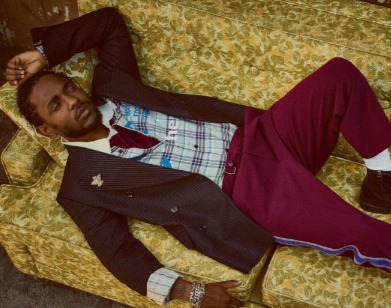norf norf
Vince Staples Is Exactly Who—and Where—He Wants to Be
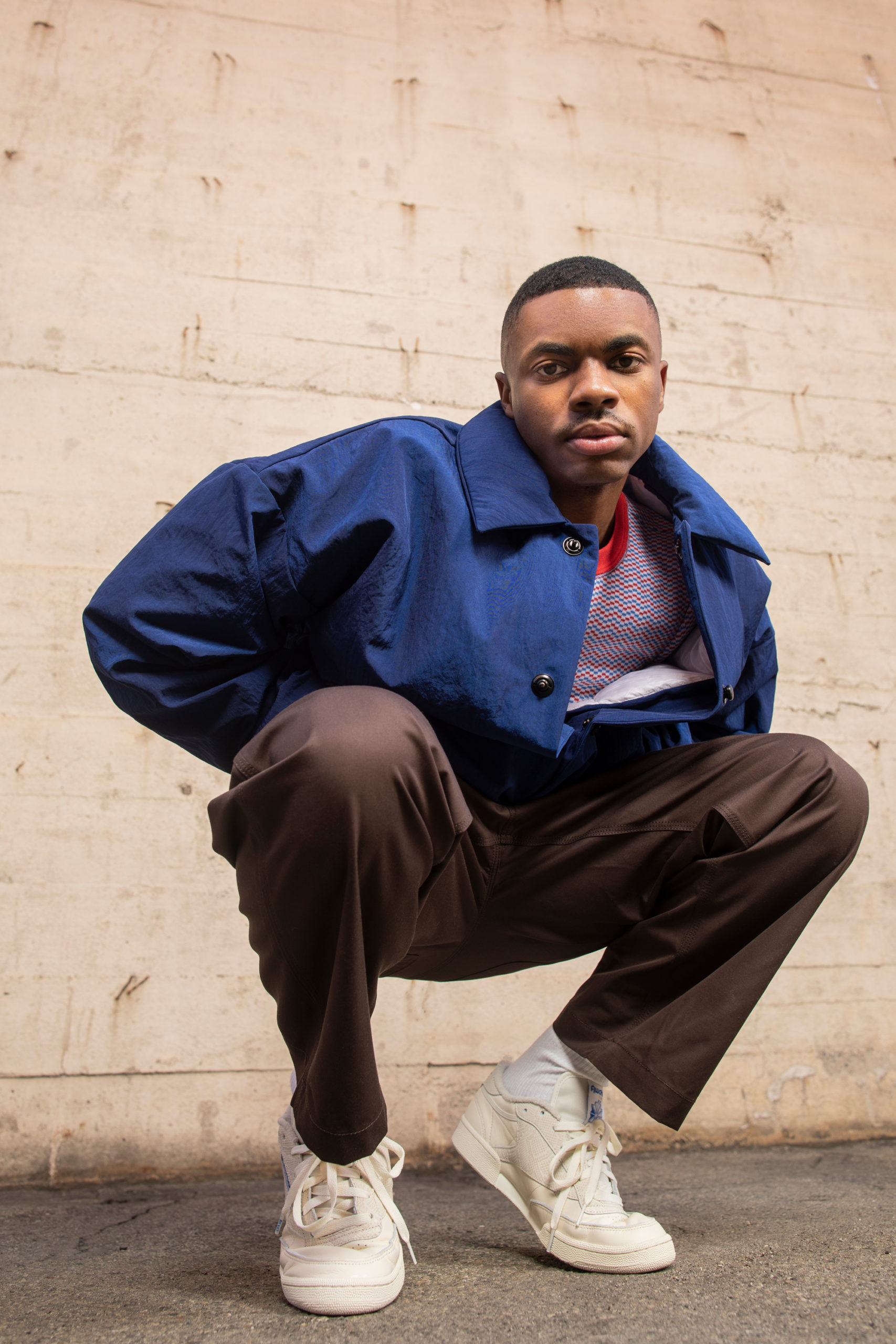
Vince Staples. Jacket by Man-tle. Pants by Camiel Fortgens. Shoes by Awake NY x Reebok. Courtesy of Departamento.
In the video for his new single “Law of Averages,” a nonchalant Vince Staples raps as everyone around him has their hands out for favors: “I don’t want no friends with no open hands / Count my bands, all alone at home don’t you call my phone / Everyone I’ve ever known asked me for a loan.” Staples has come a long way since the release of his 2015 debut Summertime ‘06, but in a way, he hasn’t moved at all. Despite a streak of critically acclaimed albums, a popular YouTube show, a podcast, and one of the best Twitter accounts out there, Staples remains grounded, proudly based in his native Long Beach, far away enough from the hollow industry schmoozing of Hollywood, and close enough to the streets and the people that have shaped him creatively. If his success has changed the way the world sees him, it has not changed the way Staples sees the world. “Law of Averages” marks our first taste of an especially prolific period in Staples’s life. He recorded hundreds of songs last year, some of which have ended up on his upcoming self-titled album, out July 9, and a follow-up called Ramona Park Broke My Heart. But the 27-year-old musician hasn’t been confined to the recording booth. He’s currently at work on a Netflix series, and a just-announced graphic novel called Limbo Beach. Here, he speaks with the actor and writer Jermaine Fowler about his upcoming wave of new music, finding his professional sweet spot, and why home is still where his heart is.
———
JERMAINE FOWLER: Congrats on the release, Vince.
VINCE STAPLES: It’s just a song at the end of the day. Can’t let it make or break you.
JERMAINE FOWLER: Yeah, it’s yours. That’s all that matters.
STAPLES: Exactly. I don’t really think about this part of it. I don’t be checking stuff, or looking for a certain response. If I’m happy with it, that’s enough for me.
FOWLER: I agree with that. A lot of people make it for a response, and I’ve never understood that.
STAPLES: I get it. I don’t think it’s a negative thing. When I first started, and I was getting all these opportunities, just because of the things or people I stumbled upon, or the rooms I stumbled in, I was so grateful. You have these key phrases like, “This is a good opportunity,” or things of that nature, and you don’t want to neglect those things, so sometimes you end up focusing too much on that, because you know what a unique position you’re in, and you don’t want to waste it. That can lead you to be a people pleaser, only because you know you were put here by the people. But it’s give and take.
FOWLER: It is a balance. I believe being appreciative and being grateful for the people that helped build your career, and the people that buy the albums, come out to shows and support you, is extremely important. But the balance of that and making yourself happy is important, too.
STAPLES: At the end of the day, it’s just going to be you. They won’t be here when it’s all over. Because as soon as they don’t care about you, they don’t. And it’s okay because you’re not a person when you do this, you’re entertainment. And if people see themselves in you, or see who they want to be, they’ll take ownership and live vicariously through you as fans. Michael Jackson was essentially alone when it all ended, but he had millions of fans.
FOWLER: I think even the monkey left.
STAPLES: The monkey was not there. I don’t know if his life expectancy was that long. I think the orangutans live forever. But that was a tiny monkey.
FOWLER: What’s dope is that you have such an organic following. It wasn’t manufactured. People love you for who you are. And that’s the beauty of your music. I’ve always appreciated how comfortable you are in your songs. With every verse, every word, you’re listening to a guy who feels confident and comfortable.
STAPLES: It’s funny you say that, because I wasn’t used to being comfortable at all. I didn’t like making music. If you listen to a lot of the older stuff, it was very monotonous and a little offbeat. I was just unenthused, because it was a weird position to be in. When I first started doing shows, it wasn’t easy. I would be checking my phone mid-performance and not looking at the crowd. I still don’t like when people look at me or talk to me. I was never an outgoing person. I’m still not. It was something I had to learn. I used to go on tour and Schoolboy Q would be like, “Your music’s too slow, you need to do this, you need to do that.” And it’s like, do you have to have music that people jump around to? Personally, I don’t jump around, I don’t dance, I’m calm all the time.
FOWLER: That’s a revelation to me. To the new fan, or someone who’s just getting into you and might see you checking your phone on stage, that’s Vince. That’s one of the charms that comes with you.
STAPLES: I knew I had 30 minutes, so I was checking the clock. When shows got bigger, I used to have a clock on the side of the stage, checking the time just to make sure that I wasn’t going under.
FOWLER: What made you grow into the Vince we know now?
STAPLES: I stopped doing shows. I recorded hundreds of songs last year. And then me and Kenny [Beats] did 30. And I put out eight of them. I was playing certain music for certain people, and even though I liked it, it wasn’t connecting. I never played music for people, I never had a community, I never had people helping me. I was just trying to figure it out by myself. My manager can only help so much, because he doesn’t make music. Or my DJ, Westside Ty, it was me and him and that was it. I’ve never really had a A&R that was consistently helping me in the studio, I’ve never been in no sessions, I don’t rub elbows, I’m not from that kind of world. So it was hard for me to be at a Grammy party with a bunch of people I didn’t know. It makes me paranoid.
FOWLER: I feel that way at times. There’s a certain energy that I gravitate towards, and there’s a certain energy I prefer not to be around. At the end of the day, I just want to write, act, and be creative. If I’m not doing that, I feel uncomfortable.
STAPLES: I don’t need to be in Calabasas or Bel-Air. That shit is not cute to me, bro. I’m a simple person. My older homies from my neighborhood will be like, “Oh, come on, little bro, you need to get fly, you need to shit on these niggas. We need to get you this, and that.” It’s like, “Bro, I’m almost 30 years old and we have on sweatpants right now and we’re in your mother’s house hanging out.” It makes you think about the way that music changes a lot of things. My homies have known me my whole life, so they will try to tell me where my shortcomings are, from a fan’s standpoint. But I got to the point where I was like, “That’s okay, I don’t mind it.”
FOWLER: What shortcomings are they talking about?
STAPLES: There’s a disconnect. I might not be regarded as a great musician or a lyricist. I’m a dude that just does different things, and I’m interesting and funny.
FOWLER: Do you feel like at some point your personality overshadowed what you were putting out musically?
STAPLES: Yes, but that’s part of it. We set ourselves up for that because of social media, and that’s just the way the world is right now. It doesn’t really bother me, but it’s definitely a thing.
FOWLER: What’s funny is that there are people that would kill to have their Twitter as highly regarded as yours.
STAPLES: Exactly.
FOWLER: I had to delete Twitter recently. I’m done with it.
STAPLES: It’s a very dark place. The internet shows you how evil people are.
FOWLER: I couldn’t agree more. But your Twitter is one of those bright spots, because it’s entertaining as fuck. You’re honest as shit, and you’re very raw. Your Twitter is genuinely just a great place to be at. I’m not surprised that people gravitate towards it. I think it’s fantastic.
STAPLES: I appreciate that.
FOWLER: Back to the album. How do you decide on a release date?
STAPLES: This has been done since December. It only took me eight sessions. But it’s just teamwork. If I’m like, “I want to release it on this day,” and Corey’s like, “No,” and the label is like, “No,” then we’re not doing it. I’m not the biggest artist, so they work really hard to make sure I have visibility. A lot goes into it.
FOWLER: Is there a process to your writing? Do you have to write at a certain place, at a certain time?
STAPLES: No. But it is something really specific to me, and it’s been like this for years. I’ve tried to change it, but I can’t sit down and write a song. I listen to the beat, and if I don’t have the song, I turn it off. And sometimes I have beats for months, or years. I had a beat from 2018 that I didn’t have any ideas for, but then one day I just turned it on, and I had the whole song in my head. But if it’s not like that, it’s not nothing at all. It’s really hard to explain.
FOWLER: Do you feel like now that you’ve been in the game a bit, that you’re ready to mentor and take on young artists?
STAPLES: I don’t think I’ll ever do that, to be honest. Because I don’t know anything about music, bro. I just know how to do me. If you’re taking something from somebody, you have to know how to get them to the top level. And I personally haven’t reached the top level, in my opinion. I’m not Drake. Drake should be doing that. But if anybody ever wants my opinion on something, I’ll share that. All you got to do is ask, because I don’t believe in hogging information.
FOWLER: So with that said, do you feel like you’re still improving?
STAPLES: Yeah, I’m getting better all the time. But a lot of it is just space, the opportunity to record all these songs and not use none of them. The ability to hold onto certain things and get it right. I think that’s what helped me get better.
FOWLER: Is there one aspect to your music, or music in general, that you appreciate more? Do you prize writing and lyrics over flow and form? Or do you prefer flow and form over lyrical ability?
STAPLES: Neither, to be honest. I think my favorite thing about music is that it gives you a space to talk through things because I don’t really want to talk to anybody else. But that’s what I take from music, the process, the creation. Being able to tour is a plus. I like seeing the world. I’m not the biggest artist, which has, to me, always been a great thing, because I’ve been able to play a festival and walk around for two days by myself. I don’t need security guards. I feel like who I am as a person, and what I create has evened out, and allowed me to be in a good position. And not to be on no destiny-type shit, but the second that it’s supposed to be different, I feel like it will be.
FOWLER: You’re from Long Beach, and you’re still there. Was there a reason why you decided to stay and not go to New York, or any other major city to relocate, and bump heads and shoulders with other artists, or executives, or anything like that? Why’d you stay in Long Beach?
STAPLES: I don’t know, it’s weird. I tried to live in L.A. for a little bit, and it just wasn’t me. And Long Beach is barely L.A. County. Long Beach is basically in Orange County. We have Lakewood Mall, we have Cerritos Mall. We don’t have Beverly Center, or things of that nature. So I think it’s just a cultural thing and a comfort level. There was really nothing against anywhere else, it’s just not how I grew up. But I appreciated what I got from there. But as far as going to other states, I think about it sometimes, but everything is here, and my people are here. And that’s what I pull from. My mom was living in Atlanta for a long time, and she wasn’t going to say she didn’t like it, she still ain’t going to say it, but she didn’t like it, she wasn’t happy. She could have a bigger house, or she don’t have to work, but that didn’t mean anything to my mom. My mom just wants to be able to go to Gardenia to get barbecue. Think about how fucking wild that is. My momma doesn’t even tell people she’s my momma.
FOWLER: What?
STAPLES: I’m really simple and I came up simple. My parents and my grandparents taught me to just be yourself, no matter what. My friends never tried to get me to drink, or do drugs, or go do something I wasn’t trying to do myself. So I think that carried over to my professional life.
FOWLER: Being famous in your hometown can go one of two ways. Either people treat you like a regular dude, or they treat you like the mayor. What’s it like for you back there?
Vince: I’m not famous like that. A lot of people don’t know what I look like. If my homie has a baby shower, and I pull up and I’m by myself, and I’m not acting like I’m somebody, even if somebody thinks that I’m me, they’re going to be like, “Nah, that’s not that nigga.” Or they’ll be like, “Oh, what’s up, bro?” If we get along, if it ain’t been no historical conflicts, then I don’t have no problem with you. I ain’t never been no bully, I ain’t never been nobody who walking around trying to be tough all day. I be chilling. So you treat people how you want to be treated. So whenever I go home, I’m not special.
FOWLER: Let’s talk about the Netflix project. Is there anything you can tell me about it?
STAPLES: It’s going to be an extension of what we were doing with the YouTube stuff. It’s going to be a broadening of the YouTube series to where I’m getting help from Kenya [Barris] and Netflix to just make exactly what I made, but more finished, and not a five minute thing. We don’t have a formula yet. I just know that they’re like, “Do what you want to do.” And with Dave and Atlanta, I’m trying to make sure that my thing is clear of what everyone else is doing.
FOWLER: Is acting what you want to do more of?
STAPLES: I don’t even know if it’s acting. I always liked movies more than music, as funny as that is. I didn’t grow up listening to music, I grew up watching movies.
FOWLER: Get the fuck out.
STAPLES: I promise you. I didn’t listen to music growing up. It was because of access, though. I grew up in the iPod generation. You ain’t got no iPod, you ain’t got no music.
FOWLER: What’s your favorite movie?
STAPLES: To this day it’s Back to the Future. I know it’s not the best movie, but that’s my favorite movie. And Kill Bill.
FOWLER: When I tell people my favorite movies are Sleepy Hollow and The Rock, they get confused.
STAPLES: Bro, I really like watching white people travel through time. I don’t know why.
FOWLER: It’s cozy.
STAPLES: Yeah. My grandpa would watch The Twilight Zone, and The Andy Griffith Show, and I spent a lot of time at my grandparents house. I can’t tell you one hotel I’ve been in, or the name of five festivals I’ve played. Everything is a blur. But I feel a connection to those moments when I was growing up. So I’ve always liked television. And that’s why I care so much about music videos. If I like my music video, I don’t care how much anything sold, I don’t care who listens to my music, as long as the video is tight. If somebody is like, “That song is trash, but the music video is tight,” I’m going to be like, “Alright, that’s cool.”
You can find the pre-save link to Vince Staples here.
———
Grooming: Michael David Warren




